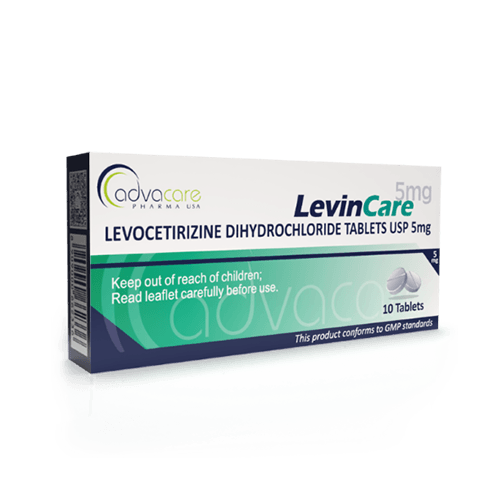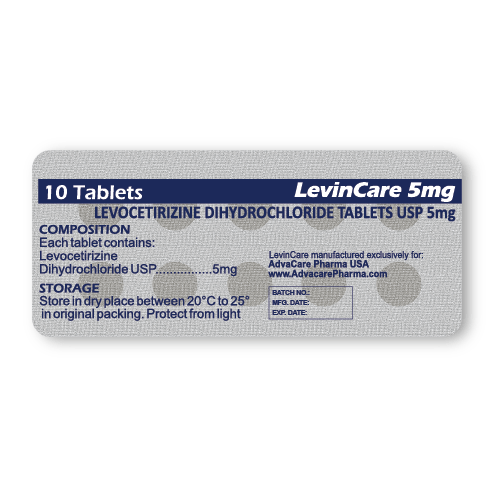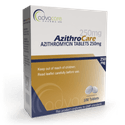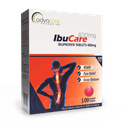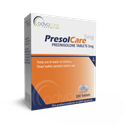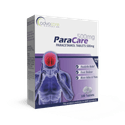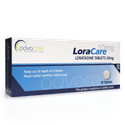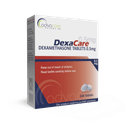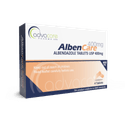- Home›
- Pharmaceuticals›
- Pharmaceutical Tablets›
- Levocetirizine Tablets
Levocetirizine Tablets
Dosage
Packaging
What is Levocetirizine?
Active Ingredients: Levocetirizine
Levocetirizine Tablets are an antihistamine drug used to treat allergic rhinitis (seasonal allergies) and uncomplicated cases of chronic idiopathic urticaria (hives). This drug is used to relieve symptoms like pruritus, watery eyes, runny nose, itching, and sneezing.
This medication may temporarily relieve the symptoms associated with these conditions, but it does not cure the condition. Levocetirizine is less likely to cause drowsiness than other antihistamines.
Levocetirizine is a second-generation antihistamine that selectively antagonizes histamine H1 receptors. Histamine is then prevented from activating its receptor which results in decreases in smooth muscle contraction, vascular permeability, basophil histidine uptake, cough receptor stimulation, and nervous system flare responses, which are responsible for many allergy-related symptoms. Levocetirizine has lower blood brain barrier permeability than first-generation antihistamines, making it less likely to cause drowsiness than other antihistamines.
AdvaCare is a GMP-certified producer and supplier of Levocetirizine Tablets, Levocetirizine Oral Solution, and Montelukast + Levocetirizine Syrup. This medication is manufactured in our factories in China, India, and the USA. We routinely inspect our production facilities to ensure our products meet quality and safety standards.
Why are we a trusted Levocetirizine manufacturer?
We are a Levocetirizine manufacturer engaged in the global distribution of 200+ oral solid pharmaceutical products in tablet dosage form.
As an American-owned and operated company, we are devoted to the manufacture and supply of superior quality, yet cost-effective pharmaceuticals to improve access to healthcare solutions worldwide. AdvaCare Pharma manufactures Levocetirizine Tablets, and over 500 other pharmaceutical treatments, according to strict GMP regulations as part of our global commitment to bring efficacious medicines to pharmaceutical distributors, hospitals, pharmacies and other medical institutions.
Uses
What is Levocetirizine used for?
It is used to temporarily relieve common symptoms caused by seasonal and perennial allergies, such as runny nose, watery eyes, and sneezing. It also relieves the itching caused by hives.
How are Levocetirizine Tablets used?
This medication is intended to be taken orally. Levocetirizine Tablets can be taken with or without food. Take Levocetirizine Tablets at the same time every day.
What dose should be taken and for how long?
Levocetirizine can be administered to adults and children, but caution is advised for specific groups of patients.
Adults and Children (12 - 17 years) For the relief of symptoms of seasonal allergies, the recommended dose is 5mg (1 tablet), taken once a day. A dose of 2.5mg (1/2 tablet) may be used for less severe symptoms. Do not exceed a daily dose of 5mg.
Children (6 - 11 years) For the relief of symptoms of seasonal allergies, the recommended dose is 2.5mg (1/2 tablet), taken once a day. Do not exceed a daily dose of 2.5mg.
Levocetirizine Tablets can be taken as needed or for the long-term management of allergy symptoms.
The dosage is based on medical condition, response to treatment, age, and weight. Refer to a doctor or pharmacist for guidelines on dosage. Do not exceed what they advise.
What if a dose is missed?
Take the missed dose as soon as possible. Skip the missed dose if it is almost time for the next dose. Do not take two doses at once.
Who can use Levocetirizine?
Levocetirizine can be administered to adults and children (≥ 6 months), but caution is advised for specific groups of patients.
Pregnant Animal studies have not found evidence that levocetirizine administration during organogenesis resulted in fetal harm at exceedingly large doses. Animals given exceedingly large doses of levocetirizine during late gestation and lactation saw no effects on offspring development, however, those given 95 times the maximum recommended human dose observed decreased offspring weight gain during lactation. Clinical and postmarket data in human pregnancy are insufficient to identify any drug-associated risks of miscarriage, birth defects, or adverse maternal or fetal outcomes. Levocetirizine should only be used during pregnancy if deemed medically necessary.
Nursing Levocetirizine is excreted in human milk. Larger doses or longer treatment durations may cause infant drowsiness or decreased milk supply. Some patients taking various antihistamines have reported infant irritability and colicky symptoms. Due to levocetirizine’s contraindication in children < 6 years, levocetirizine use is not recommended while nursing.
Pediatric Pediatric patients < 6 years old should not take levocetirizine. In pediatric patients < 12 years, there are no long-term clinical trials of levocetirizine use for treating allergic rhinitis or chronic idiopathic urticaria. Children < 12 years with impaired renal function should not take levocetirizine.
Geriatric Clinical studies did not include sufficient numbers of older adults (≥ 65 years) to determine whether they respond differently than younger adults (< 65 years). Other clinical reports have not identified differences in responses with levocetirizine use between older and younger adults that would limit its usefulness in treating older adults. Due to age-related decreases in organ function, dosing in older patients may warrant adjustments based on concomitant disease and drug therapy.
Other warnings
In patients with renal insufficiency, dosage reductions are recommended. Levocetirizine use is not recommended in those with severe renal insufficiency, end stage renal disease, or those undergoing hemodialysis.
In patients with hepatic insufficiency, dosage adjustments are not necessary, as levocetirizine is mainly excreted by the kidneys. Cases of transient, reversible hepatic transaminase elevations and hepatitis with elevated bilirubin have been reported with levocetirizine use.
Some patients taking levocetirizine have reported events of somnolence, fatigue, and asthenia. Caution should be exercised when performing actions that require complete mental alertness and motor coordination, such as operating a vehicle or machinery. Levocetirizine use in combination with alcohol or other central nervous system depressants (local anesthetics, sleeping pills, muscle relaxers, anticonvulsants) is not advised, as they can increase any reductions in alertness and coordination.
Some patients taking levocetirizine have urinary retention. Patients with a predisposition to urinary retention from spinal cord lesions, benign prostatic hyperplasia, or concomitant use of other medications that can result in urinary retention should exercise caution and discontinue levocetirizine if urinary retention occurs.
Overdoses of levocetirizine have been reported. Most overdoses in children resolve spontaneously, with drowsiness and sedation being the main adverse effects observed. Cases in adults have mainly resulted in drowsiness. Children often present with agitation and restlessness, followed by drowsiness. There is no known antidote to levocetirizine, and it is not effectively removed by dialysis. The treatment of levocetirizine overdoses is typically supportive and symptomatic.
Carcinogenicity studies have not been performed with levocetirizine. Studies of a similar chemical, cetirizine, did not find evidence of carcinogenicity or fertility and reproductive impairment when administered to rats. A 2-year study in mice found an increased incidence of benign hepatic tumors in males at doses 15 times greater than the adult maximum recommended human dose (MHRD). Increased tumor incidences were not observed at doses 4 times greater than the adult MHRD. The clinical significance of these findings for the long-term levocetirizine use in humans is unknown. In vitro assays did not reveal mutagenicity as a result of levocetirizine exposure.
Rare, potentially severe adverse events have been reported with cetirizine and levocetirizine use, including severe hypotension, anaphylaxis, hemolytic anemia, acute generalized exanthematous postulosis (AGEP), convulsions, hallucinations, suicidal ideations and suicide, cholestasis, orofacial dyskinesia, glomerulonephritis, hepatitis, stillbirth, thrombocytopenia, and rebound pruritus-pruritus within a few days after treatment discontinuation and typically following long-term use (months to years).
Patient narrow-angle glaucoma should exercise caution when using levocetirizine, as it may dilate the pupil and lead to sight-threatening adverse events. The potential for levocetirizine to precipitate narrow-angle glaucoma in those who are at risk should be considered.
Levocetirizine does not have any known severe drug interactions that are potentially dangerous. Levocetirizine may have serious interactions with certain monoamine oxidase inhibitors (MAOIs), like isocarboxazid and tranylcypromine. Concomitant administration of levocetirizine with P-glycoprotein inhibitors, such as erdafitinib or verapamil, may prevent the efflux of levocetirizine from the CNS and increase its antihistaminic activity.
Side Effects
As with all pharmaceuticals, some unwanted effects can occur from the use of Levocetirizine Tablets.
Common side effects include, but may not be limited to:
- drowsiness, dizziness
- dry mouth
- sore throat
- tiredness
- constipation
- nausea
- headache
Seek medical attention if the following develop:
- signs of severe allergic reactions (hives, rash, itching)
- kidney problems (decreased or difficulty urinating)
- swelling of arms, hands, feet, ankles, lower legs
- ear infections (in children)
- excitability or restlessness (in children)
- changes in vision
- tremors or insomnia
- confusion
- fast, irregular heartbeat
For a comprehensive understanding of all potential side effects, consult a medical professional.
If any symptoms persist or worsen, or you notice any other symptoms, please call your doctor immediately.
Precautions
Do NOT use Levocetirizine Tablets if:
- You are allergic to levocetirizine, cetirizine, or any of its ingredients.
- You have severe kidney damage or are on dialysis.
- You have a predisposition for urinary retention.
- You have a lower respiratory disease, such as asthma.
Due to possible drug interactions, consult with your doctor about any medications you are taking before your treatment, especially anticonvulsants, ritonavir, monoamine oxidase inhibitors, and sedatives, tranquilizers, or sleeping pills.
This medication may not be suitable for people with certain conditions, so it is important to consult with a doctor if you have any health conditions.
Avoid alcohol while taking levocetirizine. Driving or operating machinery should be avoided until you understand how the medication will affect you.
References
Levocetirizine improves quality of life and reduces costs in long-term management of persistent allergic rhinitis
This is a 6-month double-blind, placebo-controlled, multicenter, multinational trial conducted in 551 patients. Patients with persistent rhinitis sensitized to both grass pollen and house dust mites were randomized to receive levocetirizine 5mg/d or placebo.
The full study was completed by 421 patients. Levocetirizine demonstrated big improvement in both the overall score of the Rhinoconjunctivitis Quality of Life Questionnaire and the Total 5 Symptoms Score from weeks 1 to 6 months (all P values <.001). The Medical Outcomes Survey Short Form 36 summary scores showed improvement in the levocetirizine group compared to the placebo group. Treatment discontinuation due to lack of efficacy, comorbidities, and overall disease costs, as well as comorbidities per working patient per month (€160.27 vs €108.18), were lower in the levocetirizine group.
The conclusion of this study is that levocetirizine can improve quality of life and symptoms and decrease the overall costs of the disease over the 6-month treatment period.

You might be interested in...
Why AdvaCare Pharma?
As an industry leader, we are aware of our responsibility to provide affordable and sustainable solutions to improve healthcare worldwide.
